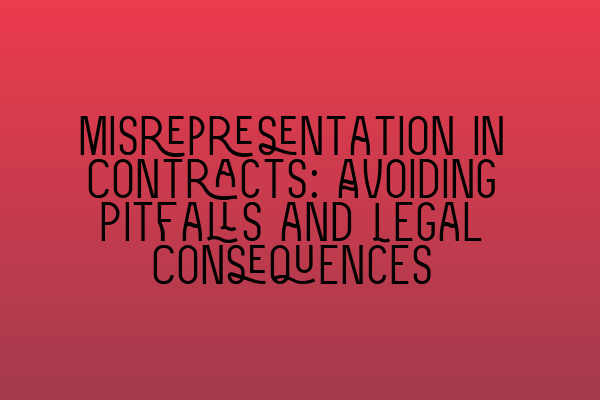Misrepresentation in Contracts: Avoiding Pitfalls and Legal Consequences
In the world of contract law, misrepresentation is a serious matter that can have significant legal consequences for all parties involved. It occurs when one party makes a false statement or assertion that induces another party to enter into a contract. If left unchecked, misrepresentation can lead to disputes, financial losses, and even damage to one’s reputation. As a solicitor, it is essential to understand the nuances of misrepresentation and how to avoid its pitfalls. In this blog post, we will delve into the topic of misrepresentation in contracts, provide practical tips for avoiding it, and highlight the legal consequences that can arise.
Understanding Misrepresentation:
Misrepresentation can take many forms, including false statements, misleading omissions, or half-truths. The misrepresenting party may make these statements knowingly or unknowingly, but regardless of intent, the consequences can be severe. Contracts are established based on the principle of good faith and honesty, and misrepresentation undermines this fundamental principle.
Types of Misrepresentation:
There are three main types of misrepresentation: innocent, negligent, and fraudulent.
1. Innocent Misrepresentation: This occurs when the misrepresenting party genuinely believes the statement to be true and has no reason to suspect otherwise. Even though it lacks fraudulent intent, innocent misrepresentation can still result in the contract being voidable.
2. Negligent Misrepresentation: Negligent misrepresentation arises when the misrepresenting party does not exercise reasonable care in verifying the accuracy of the statement. This can happen when the party fails to conduct sufficient research or relies on incomplete or outdated information.
3. Fraudulent Misrepresentation: Fraudulent misrepresentation is the most severe form of misrepresentation. It involves a deliberate and knowing falsehood made with the intent to deceive the other party. Fraudulent misrepresentation renders the contract voidable and can lead to legal action for damages or rescission.
Avoiding Misrepresentation Pitfalls:
To avoid misrepresentation and its potential legal consequences, it is important to follow these practical tips:
1. Be thorough in your research: Before making any statements during contract negotiations, conduct thorough research to ensure the accuracy and completeness of the information you provide.
2. Seek legal advice when necessary: If you are uncertain about any aspect of the contract or any statement you are about to make, consult a legal professional who can guide you through the process and help you avoid misrepresentation.
3. Document everything: Keep detailed records of all communications, negotiations, and discussions related to the contract. This documentation can serve as evidence of your good faith and the accuracy of your statements.
4. Be clear and precise: When making statements or representations, ensure that you are clear, precise, and avoid vague or ambiguous language that could be misinterpreted.
5. Disclose all material information: Make sure to disclose all material facts and information within your knowledge that may impact the other party’s decision to enter into the contract. Failure to disclose material information can also lead to claims of misrepresentation.
Legal Consequences:
When misrepresentation occurs, the innocent party has several legal remedies available, including:
1. Rescission: The innocent party can request to rescind or cancel the contract, effectively returning both parties to their pre-contract positions.
2. Damages: If the innocent party has suffered financial losses as a result of the misrepresentation, they may seek damages to recover those losses.
3. Specific Performance: In some cases, the innocent party may seek specific performance, which requires the breaching party to fulfill their obligations under the contract as originally intended.
It is worth noting that the legal consequences may vary depending on the type and severity of the misrepresentation.
Conclusion:
Misrepresentation in contracts is a complex and potentially damaging issue. As solicitors, it is crucial to be aware of the various types of misrepresentation, take proactive steps to avoid it, and understand the legal consequences that can arise. By conducting thorough research, seeking legal advice when necessary, documenting all communications, being clear and precise in your statements, and disclosing all material information, you can significantly reduce the chances of misrepresentation occurring. Remember, promoting honest and transparent dealings is not only good business practice but also essential for maintaining your professional reputation.
Related Articles:
– SQE 1 Practice Exam Questions
– SQE 1 Practice Mocks FLK1 FLK2
– SQE 2 Preparation Courses
– SQE 1 Preparation Courses
– SRA SQE Exam Dates
